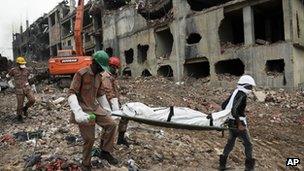Retailers agree Bangladesh garment factory inspections
- Published

The Rana Plaza factory building collapsed, killing more than 1,100
A group of 70 retailers have agreed a plan to conduct inspections of garment factories in Bangladesh in an attempt to improve safety standards.
They will provide details of factories they source goods from, which will be inspected within the next nine months.
Funds will be made available for any safety upgrades needed at the units.
The legally-binding code was announced earlier this year after the collapse of a garment factory in Bangladesh in April killed more than 1,100 people.
The eight-storey Rana Plaza building came crashing down on 24 April, a day after cracks had been spotted in the building.
It was the deadliest in a series of accidents that have resulted in global attention being focussed on safety standards in Bangladesh's garments export industry, the second biggest in the world after China's.
'Strong coalition'
Several big names, including Sweden's H&M, the biggest buyer of Bangladeshi-made clothes, signed up to the code after the incident.
It requires them not just to meet minimum fire and building safety standards, but also to pay for them.
Other signatories include Inditex, which owns Zara, Benetton, Metro, Carrefour, Marks and Spencer, Tesco, Esprit and Abercrombie & Fitch.
"This historic, legally binding accord will effect tangible change on the ground and help make the Bangladeshi garment industry safe and sustainable," said Jyrki Raina, general secretary of IndustriALL, a labour group which played a key role in creating the pact.
Brian Kohler, from IndustriaLL, says it is "regrettable" that some big names have not signed up to the accord
Mr Raina added, external that the factory fires and collapses in Bangladesh over the past few years indicated that efforts by individual retailers had "proved insufficient" in addressing the issue.
"A profound change is possible only with a strong coalition between trade unions, international brands and retailers, Bangladeshi authorities and employers, and with worker involvement in the workplace with guaranteed freedom of association."
The International Development Secretary, Justine Greening, said UK companies needed to play their part in helping raise standards: "British business must be a force for good in the developing world too, so that together we can help end aid dependency through jobs."
She said she had been talking to business leaders from the retail industry to decide how they could work with the government to improve supply chains, in order to ensure clothes were produced responsibly and conditions were improved.
Last month, US suspended trade privileges extended to Bangladesh over concerns about dangerous working conditions and labour rights.
This decision was taken after a year-long review of labour practices and workplace safety in Bangladesh.
- Published28 June 2013
- Published14 June 2013
- Published15 May 2013